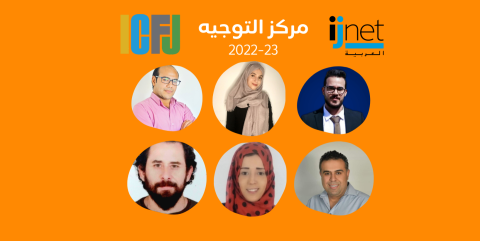
Independent media across the Middle East and North Africa face significant challenges today. Three Arab countries ranked as the worst places for journalists to work in the Committee to Protect Journalists' 2021 Global Impunity Index as conflict, political instability, social and economic instability, and weak judicial mechanisms perpetuate a cycle of violence against journalists. In addition, many journalists have been imprisoned for their work.
Media entrepreneurs in the region are navigating these challenges and more today. On its ninth year, IJNet Arabic's Mentoring Center for Media Startups has helped guide and support pioneering digital entrepreneurs in achieving their journalism goals by equipping them with digital and professional skills and connecting them with some of the brightest specialists in journalism, marketing and financial sustainability.
This year’s 2022-23 mentees — based in Egypt, Jordan, Iraq, Tunisia and Yemen — will receive mentorship on sustainable growth and innovation strategies, as well as advice on how to seek new sources of revenue to support their work. Throughout this 10-month program, the mentees will also learn how to strategize, develop and present content that meets the needs of their respective audiences, and advance effective marketing plans.
“The most important skills for participants to learn are how to operate in a constantly evolving and complex situation. In modern journalism, business and networking are as important as writing, reporting and photography,” said mentor Ramsey Tesdell, founder of the independent Jordan-based news outlet, 7iber, and executive director of the podcasting platform, Sowt.
Ahmed Esmat, the executive director of Alexandria Media Forum, joins Tesdell for the second year as a program mentor. Based in Cairo, Esmat is an expert in entrepreneurship, innovation, digital marketing and media management. “Journalists must realize how business models are built and adapted to serve media projects and the essential ways to develop strategies and marketing,” Esmat said. “We are working with the participants to develop several pillars and help them build the mentality of an entrepreneur in journalism, and create revenue generation systems such as subscriptions, memberships, and others."
In addition to ongoing virtual mentoring, mentees and mentors will participate in a two-day bootcamp in early December held alongside the 15th annual Arab Reporters for Investigative Journalism (ARIJ) Forum in Amman, Jordan.
Here are this year’s mentees and their respective media projects:
Qoboul Al-Absi
Yemen
Qoboul Al-Absi is the chairperson of the Qarar Foundation for Media and Sustainable Development and a community activist for Yemeni refugees. Through the Mentoring Center, Al-Absi hopes to develop stronger tools and techniques to be able to better carry out in-depth investigative reporting as well as use data journalism and infographics in their reporting. She plans to build up a strong network of journalists through the mentorship experience, as well.
Syrine Abidi
Tunisia
Syrine Abidi is a social entrepreneur, podcast producer and citizen journalism trainer. She runs Kortable, a platform specialized in creating podcasts and documentaries on human rights, entrepreneurship and environmental awareness. Abidi seeks to develop her podcast and documentary equipment in order to better professionalize her content. She also aims to learn about different sources for media sustainability and reach a wider audience during the program.
Ahmed Atef Ramadan
Egypt
Ahmed Atef Ramadan is an Egyptian investigative journalist who runs “Radar Newsletter,” the first newsletter in Egypt dedicated to fact-checking rumors and disinformation. During his participation in the program, Ramadan seeks to create a community of fact-checkers and contribute to media literacy to help readers navigate false or misleading news.
Ahmed Showky Atar
Egypt
Ahmed Shawky Elattar runs a media platform specializing in climate change issues in Egypt and the Middle East. Called “Ozone,” the platform covers environmental stories and raises awareness of climate change issues. During his participation in the Mentoring Center, Elattar seeks to develop a long-term business strategy and ensure the sustainability of his project.
Rabi Abuhassan
Jordan
Rabi Abuhassan runs RaienTV, a media platform that aims to produce human stories and document the achievements of underrepresented people and marginalized communities. During his participation in the program, Abuhassan hopes to develop a sustainable business model while continuing to diversify his content to better cover communities and promote human and democratic values.
Sayf Ali
Iraq
Sayf Ali operates an independent news website called akadnews, which produces reports using multimedia and short videos. Ali plans to use his time in the Mentoring Center to attract more resources to sustain the site as well as to network with journalists to increase his ability to grow the initiative and to carry out cross-border investigations.